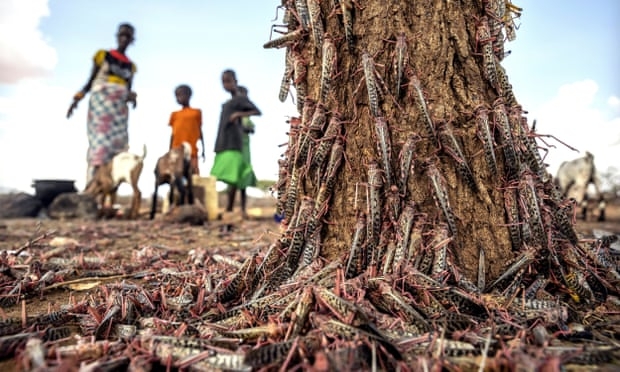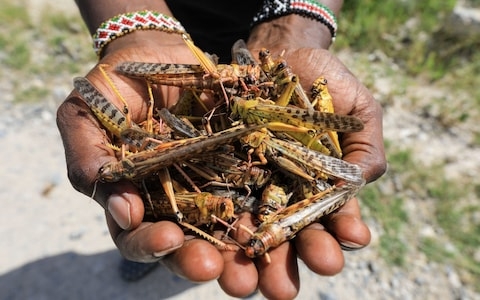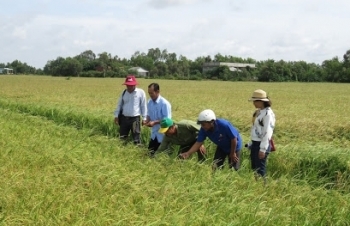East Africa braces for worst locust swarms in 7 decades
| First coronavirus infectious case confirmed in Uganda | |
| First COVID-19 case in sub-Saharan Africa: A Italian citizen works in Nigeria | |
| Vietnamese Ao dai and folk dance shine in South Africa |
 |
| The coming locust swarm is 20 times the size of the latest one (Photo: AP) |
Weeks before the coronavirus spread through much of the world, parts of Africa were already threatened by another kind of plague, the biggest locust outbreak some countries had seen in 70 years.
British science journal Nature reported that the large swarms of locusts were first detected in Ethiopia and Somalia in early 2020. They have since been spotted in at least eight countries, according to Quartz. Forbes stated that East Africa already struggles with food insecurity, with an estimated 20 million people in the six countries hit hardest by the locusts believed to already not have enough food.
Locusts are reported can travel about 90 miles a day and eat their own body weight in crops
Now the second wave of the voracious insects, some 20 times the size of the first, is arriving. Billions of the young desert locusts are winging in from breeding grounds in Somalia in search of fresh vegetation springing up with seasonal rains, according to abc news.
Locust outbreak threatens food security and people's livelihoods in East Africa countries
The United Nations Food and Agriculture Organization said the swarm of locusts present “an extremely alarming and unprecedented threat” to food security and livelihoods—according to the UN, a locust swarm of just more than a third of a square mile can eat the same amount of food in a single day as 35,000 people.
It is the locusts that “everyone is talking about,” said Yoweri Aboket, a farmer in Uganda. “Once they land in your garden they do total destruction. Some people will even tell you that the locusts are more destructive than the coronavirus. There are even some who don’t believe that the virus will reach here.”
Some farmers in Abokat's village near the Kenyan border bang metal pans, whistle or throw stones to try to drive the locusts away. But mostly they watch in frustration, largely barred by a coronavirus lockdown from gathering outside their homes.
A failed garden of cassava, a local staple, means hunger. Such worries in the village of some 600 people are reflected across a large part of East Africa, including Kenya, Ethiopia and South Sudan. The locust swarms also have been sighted in Djibouti, Eritrea, Tanzania and Congo.
Favorable breeding conditions through May mean there likely will be another new round of swarms in late June and July, coinciding with the start of the harvest season, the agency said.
The locusts are “invading the Eastern Africa region in exceptionally large swarms like never seen before," the Nairobi-based Climate Prediction and Application Center told abc news.
 |
| Locusts swarms are destructive to farming (Photo: AP) |
Uganda reported two swarms arriving last week from neighboring Kenya, further destabilizing food security and the livelihoods of people in the east and north of the country. The insects follow spring rains, seeking emerging crops and other vegetation, according to The Guardian.
Hellen Adoa, a minister at Uganda’s agriculture department, told The Guardian: “This is very active, destructive and we are worried it has come at the time of lockdown. We are a bit overwhelmed".
“The moment they arrive in a place the first thing they do is to eat anything green. They have destroyed some fields of crops and vegetation,” she added.
In Ethiopia, where some 6 million people live in areas affected by the locust outbreak, the infestation if unchecked “will cause large-scale crop, pasture and forest-cover loss, worsening food and feed insecurity,” the FAO says.
Bands of immature locusts are forming in areas that include the country’s breadbasket, the Rift Valley region, it said.
Ethiopia’s agriculture minister has said efforts are underway to deploy six helicopters against the infestation that could last until late August.
But ministry spokesman Moges Hailu spoke of an ominous sign: The locust swarms are now appearing in locations where they had not been previously sighted.
 |
| Africa is facing servere food crisis wit the advent of locusts swarm (Photo: Internewscast) |
The devastating results are worsening by COVID-19 pandemic
Millions of already vulnerable people are at risk. And as they gather to try to combat the locusts, often in vain, they risk spreading the virus — a topic that comes a distant second for many in rural areas, aba news reported
Aerial spraying is the only effective way to control the locust outbreak. After the locusts crossed into Uganda for the first time since the 1960s, soldiers resorted to using hand-held spray pumps because of difficulties in obtaining the needed aircraft.
Uganda's agriculture minister said authorities are unable to import enough pesticides from Japan, citing disruptions to international cargo shipments.
 | Farmland prices in Vietnam rise during COVID-19 Farmland is still an appealing investment for people and investors in Vietnam as they want a more environmentally-friendly place to reside. |
 | International media lauds Vietnam’s ‘Rice ATM’ The “Rice ATM” dispensing bagful of rice for vulnerable populations during coronavirus lockdown that first appeared in HCMC early April has greatly drawn international attention. ... |
 | Coronavirus latest update in Europe: Reopenings start stretching out as epicenters reported fewer infection cases Leaders from Europe began to sketch out strategies for restarting their economies as some hardest-coronavirus-hit countries including Spain, Germany and Italy all reported fewer infections. ... |
Recommended
 World
World
Pakistan NCRC report explores emerging child rights issues
 World
World
"India has right to defend herself against terror," says German Foreign Minister, endorses Op Sindoor
 World
World
‘We stand with India’: Japan, UAE back New Delhi over its global outreach against terror
 World
World
'Action Was Entirely Justifiable': Former US NSA John Bolton Backs India's Right After Pahalgam Attack
Popular article
 World
World
US, China Conclude Trade Talks with Positive Outcome
 World
World
Nifty, Sensex jumped more than 2% in opening as India-Pakistan tensions ease
 World
World
Easing of US-China Tariffs: Markets React Positively, Experts Remain Cautious
 World
World










